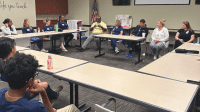As part of its initiative to recognize nurses in board leadership roles, the American Nurses Foundation interviewed Angela Barron McBride, PhD, RN, FAAN, FNAP, an Indiana State Nurses Association member. McBride is Distinguished Professor and University Dean Emerita at the Indiana University School of Nursing. She serves on the board of Indiana University Health (IUH) and chairs the board’s Committee on Quality and Patient Safety.
What has been the best part of serving on the board?
It has been exciting to shape policy with meaningful impact on practice throughout our 18-hospital system, Indiana’s largest and most comprehensive healthcare provider system. During my tenure on the board, IUH has won a number of awards for quality and safety—areas in which I have worked with the clinical leadership to establish ambitious and important initiatives.
What has been the hardest part?
When I was younger, if I had 10 good ideas, I wanted to pursue all of them. I have since learned that you have to be strategic about what you take on. On a board, this requires listening to people, working with people, and defining the biggest conceptual and policy issues that need to be addressed to help an organization move in a positive direction.
Where do you feel you’ve had the most influence?
I have chaired the Committee on Quality and Patient Safety for more than a decade. We focus on attaining and exceeding national goals for quality and safety required for reimbursements, and on important priorities, such as a new initiative to standardize best practices for pain management system-wide. We began by working to manage postoperative pain better, which led to improved patient satisfaction scores. Currently, we’re working to improve inpatient management of acute pain for people with a history of chronic pain—a complex undertaking due to risk factors for addiction. Next, we’ll work to improve management of chronic pain.
What’s your advice for nurses just beginning or midway through their careers?
Develop your personal expertise. Share that skill in a volunteer capacity so you become a known authority in that area as early in your career as possible. Begin cultivating your leadership capabilities within nursing organizations, then get involved interprofessionally, because that’s the context in which most big decisions are made. As you demonstrate your expertise and ability to work well with others, they’ll think of you for future leadership opportunities.
Hospital boards don’t tend to appoint people who work for the organization as board members. So if you work in a clinical facility and would like to build your leadership skills, look for opportunities to serve on an advisory committee for another hospital within the same chain.
What gave you the courage to step into leadership as your career progressed?
While I pursued the requisite education and experience for professional advancement, feeling like an imposter was a factor for me in my younger years until I began to notice this pattern: Each time I took a new position, I felt some trepidation about whether I would be adequate to the task. At the beginning, I worry whether I can do it. I am committed to trying. I do my best and then generally things work out well. Some of that initial worry is just to get my energy level up and is useful. The kind of worry that is counterproductive is more limited now. Knowing that I have been effective in so many different circumstances has helped me to anticipate success with self-knowledge and confidence.
I have also come to realize that if you’re not brilliant on a certain occasion, all you have to do is go back and say, “I don’t think I handled that well. Let me try again.” When you do that, people tend to find you pretty agreeable to work with.
Read more at www.anfonline.org/nurseboardleadership.


















